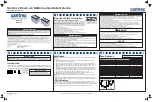
3
BATTERY SAFETY INFORMATION
For the proper use, maintenance and storage of this battery, it is important that you read and
understand the instructions given in this manual.
To avoid serious injury, risk of fire, explosion, and danger of electric shock or electrocution:
• DO NOT probe the charger with conductive materials. The charging terminals hold 120V.
• If the battery case is cracked or damaged, do not insert into the charger. Replace with a new
battery.
• DO NOT charge Westinghouse batteries with any other type of charger.
• DO NOT spill liquids on the battery or charger.
• DO NOT try to use the charger for any other purpose than what is presented in this manual.
• DO NOT try to short circuit any terminals of battery.
•
If battery fluid leaks and gets in your eyes, flush immediately with clean water for at least 15
minutes. Seek immediate medical attention.
• DO NOT charge the battery in rainy or in wet conditions. Do not immerse the tool, battery, or
charger in water or other liquid.
WARNING:
• DO NOT allow the battery or charger to overheat. If they are warm, allow them to cool down.
• Recharge only at room temperature.
• DO NOT cover the ventilation slots on the top of the charger. Do not set the charger on a soft
surface, i.e. blanket, pillow. Keep the ventilation slots of the charger clear.
• DO NOT allow small metal items or material such as steel wool, aluminum foil, or other foreign
particles into the charger vents.
•
Unplug the charger and remove battery before wiping off dust. Do not clean with liquids.
• DO NOT place the battery in the sun or in a warm environment. Keep at room temperature.
• DO NOT try to connect two chargers together.
• Keep in shady, cool and dry conditions.
• To sustain battery life make sure to charge the battery at a minimum for 2 hours every month.
•
The battery cells may develop a small leak under extreme usage or temperature conditions. If the
outer seal is broken and the leakage gets on your skin:
• Use soap and water to wash immediately. Neutralize with lemon juice, vinegar, or other mild acid.
• If leakage gets in your eyes, follow instructions above and seek medical attention.
• Do not use a damp cloth or detergent on the battery or battery charger.
• Always remove the battery before cleaning, inspecting, or performing any maintenance on the tool.
Safety notes and precautions
• DO NOT disassemble the battery.
• Keep away from children.
•
DO NOT expose the battery to water or salt water.
• Battery should be stored in a cool and dry location.
•
DO NOT place the battery in high-temperature locations, such as near a fire, heater, etc.
• DO NOT reverse the positive terminal and the negative terminal of the battery.
• DO NOT connect the positive terminal and the negative terminal of the battery to each other with
any metal objects.
• DO NOT knock, strike, or step on the battery.
• DO NOT pierce the battery with nails or other sharp objects.
• Immediately discontinue use of the battery, if, while using the battery, it emits an unusual smell,
feels hot, changes color, changes shape, or appears abnormal in any other way.




































